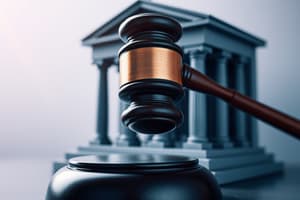Podcast
Questions and Answers
Which type of crimes involve failing to act?
Which type of crimes involve failing to act?
- Voluntary actions
- Omission crimes (correct)
- Causation crimes
- Crimes of possession
What is the key requirement for crimes involving possession?
What is the key requirement for crimes involving possession?
- Conscious and purposeful conduct
- Intent to commit the crime
- Knowledge of the consequences
- Control over an illegal item (correct)
Which of the following is NOT necessary for proving intent in certain crimes?
Which of the following is NOT necessary for proving intent in certain crimes?
- Conscious and purposeful conduct
- Knowledge of the consequences
- Control over illegal items (correct)
- State of mind
In criminal law, what does causation typically refer to?
In criminal law, what does causation typically refer to?
Which category of crimes involves consciously and purposefully perpetrated physical conduct leading to a prohibited outcome?
Which category of crimes involves consciously and purposefully perpetrated physical conduct leading to a prohibited outcome?
What legal concept is associated with crimes that involve having control over illegal items?
What legal concept is associated with crimes that involve having control over illegal items?
Which element is crucial in establishing criminal responsibility related to causation?
Which element is crucial in establishing criminal responsibility related to causation?
What is a fundamental aspect of fair prosecution in criminal cases?
What is a fundamental aspect of fair prosecution in criminal cases?
Which type of offenses represent incomplete yet ongoing forms of misconduct?
Which type of offenses represent incomplete yet ongoing forms of misconduct?
What is one example of an inchoate offense mentioned in the text?
What is one example of an inchoate offense mentioned in the text?
Which aspect is essential in ensuring fair prosecution by establishing a connection between conduct and harm?
Which aspect is essential in ensuring fair prosecution by establishing a connection between conduct and harm?
Flashcards are hidden until you start studying
Study Notes
Criminal Law Overview: Voluntary Actions, Omissions, Possession, Causation, Inchoate Offenses
Criminal law is concerned with regulating behavior deemed harmful by society and determining appropriate responses from criminal justice systems when individuals violate those laws. This brief exploration will delve into several key components within this complex legal field, addressing voluntary actions, omissions, crimes involving possession, causation, and inchoate offenses.
Voluntary Actions and Intent
Voluntary acts encompass physical conduct or verbal communication perpetrated consciously and purposefully resulting in a prohibited outcome. Proof of intent may be necessary depending upon the specific statute being applied; however, certain crimes require only knowledge of their consequences without considering the actor's state of mind.
Omission Crimes
In contrast to committing active voluntary acts, some criminal cases involve failing to act — known as omission crimes. These occurrences demand negligence, recklessness, or strict liability on behalf of the accused rather than proving they intentionally chose not to perform a given action.
Crime of Possession
Crimes of possession generally imply having control over an item considered illegal under criminal law. For example, it's unlawful to possess drugs like heroin, stolen goods, explosive devices, and so forth. However, mere proximity or association does not automatically constitute ownership, which must also factor into these claims.
Causation
A fundamental element of criminal responsibility rests on establishing a connection between the defendant's conduct and the harm suffered by victims or the community. This linkage can follow various models such as direct or indirect causality, proximate cause, intervening causes, etc., all vital aspects of ensuring fair prosecution.
Inchoate Offenses
These preliminary crimes represent incomplete yet ongoing forms of misconduct. They typically consist of attempts, conspiracies, solicitations, and preparatory activities leading towards more substantial infractions. Noteworthy examples include conspiracy to commit murder, attempted kidnapping, and preparing terrorist attacks before any actualized victimization has occurred.
Studying That Suits You
Use AI to generate personalized quizzes and flashcards to suit your learning preferences.





